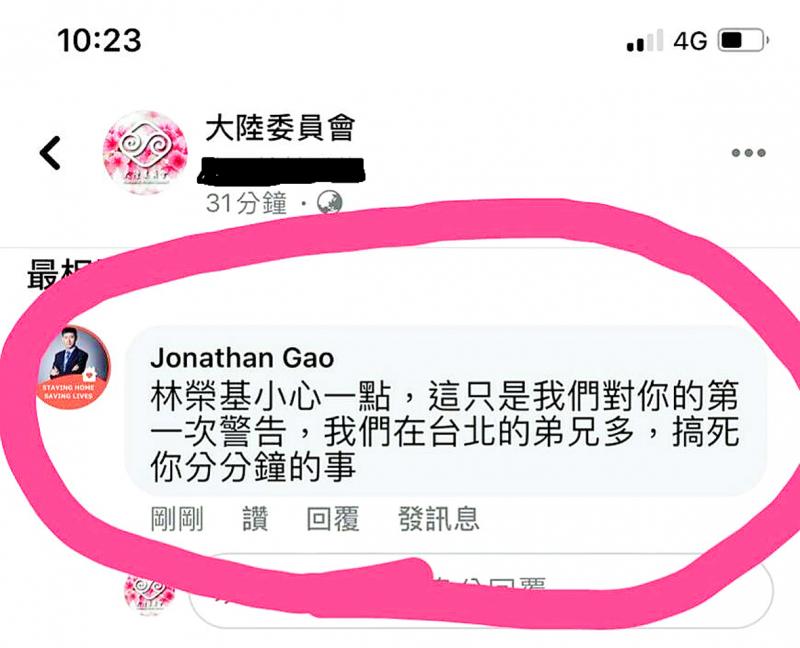Hong Kong bookseller Lam Wing-kee (林榮基) said that China was behind an attack against him, after his three alleged assailants were released on bail yesterday.
“The Chinese Communist Party’s proxies have a history of attacks carried out against Hong Kongers who fled to Taiwan,” Lam told reporters. “Now they are only causing trouble for Hong Kongers, but later they will make trouble for Taiwanese.”
Lam said that he would be more vigilant.

Photo taken from the Mainland Affairs Council’s Facebook page
“I was quite surprised to hear that the suspects got released on bail so quickly,” he added. “I am, of course, fearful and will avoid walking down dark alleys.”
Lam was co-owner of Hong Kong’s Causeway Bay Books (銅鑼灣書店), but was kidnapped in 2015 and detained in China for eight months for selling books banned by the Chinese government.
He was finally freed on bail and returned to Hong Kong, but opted not to return to China to face trial. He fled to Taiwan in May last year.
The opening of his new bookstore in Taipei is planned for tomorrow.
On Tuesday, Lam was at a coffee shop in Taipei when he was doused in red paint by an assailant, who street cameras showed fleeing on foot while two other men acted as lookouts.
Police in Kaohsiung on Wednesday arrested the three suspects — identified as Cheng Chi-lung (鄭啟龍), 55, who has a criminal record, along with brothers Tseng Shih-sheng (曾士晟), 28, and Tseng Shih-feng (曾士峰), 27 — and transferred them to Taipei for questioning.
Besides promising to enhance patrols around Lam’s new bookstore, Taipei police cited evidence of additional suspects, saying that they were tracking them down.
Yesterday, the three were released on bail of between NT$6,000 and NT$20,000.
The Taipei District Prosecutors’ Office yesterday applied with the High Court to have the three returned to detention, saying that they are likely to collude with the other suspects sought and destroy evidence.
Lam urged Taiwanese authorities to determine the mastermind behind the attack, saying that China had sent its proxies to Taiwan to physically assault and silence Hong Kongers.
On Sept. 29 last year, Hong Kong singer and actress Denise Ho (何韻詩) was also attacked in Taipei with red paint, during a pro-democracy rally for Hong Kong.
“It is not just one or two people, but a whole group of people working for China,” Lam said. “If the authorities do not get to the real force behind them, these incidents will continue to occur.”
An Internet user named “Jonathan Gao” further threatened Lam on the Mainland Affairs Council’s Facebook page, writing: “Lam you had better be careful — that was only our first warning to you. We have many gangster brothers in Taipei and we have many ways to harass you to death.”
The “Jonathan Gao” Facebook account belongs to someone who claims to be from Taiwan, but who resides in Singapore, Taipei police said, adding that the person purportedly belongs to several pro-China organizations, including the Concentric Patriotism Alliance and the China Unification Promotion Party.

Taiwanese can file complaints with the Tourism Administration to report travel agencies if their activities caused termination of a person’s citizenship, Mainland Affairs Council Minister Chiu Chui-cheng (邱垂正) said yesterday, after a podcaster highlighted a case in which a person’s citizenship was canceled for receiving a single-use Chinese passport to enter Russia. The council is aware of incidents in which people who signed up through Chinese travel agencies for tours of Russia were told they could obtain Russian visas and fast-track border clearance, Chiu told reporters on the sidelines of an event in Taipei. However, the travel agencies actually applied

Japanese footwear brand Onitsuka Tiger today issued a public apology and said it has suspended an employee amid allegations that the staff member discriminated against a Vietnamese customer at its Taipei 101 store. Posting on the social media platform Threads yesterday, a user said that an employee at the store said that “those shoes are very expensive” when her friend, who is a migrant worker from Vietnam, asked for assistance. The employee then ignored her until she asked again, to which she replied: "We don't have a size 37." The post had amassed nearly 26,000 likes and 916 comments as of this

New measures aimed at making Taiwan more attractive to foreign professionals came into effect this month, the National Development Council said yesterday. Among the changes, international students at Taiwanese universities would be able to work in Taiwan without a work permit in the two years after they graduate, explainer materials provided by the council said. In addition, foreign nationals who graduated from one of the world’s top 200 universities within the past five years can also apply for a two-year open work permit. Previously, those graduates would have needed to apply for a work permit using point-based criteria or have a Taiwanese company

The Shilin District Prosecutors’ Office yesterday indicted two Taiwanese and issued a wanted notice for Pete Liu (劉作虎), founder of Shenzhen-based smartphone manufacturer OnePlus Technology Co (萬普拉斯科技), for allegedly contravening the Act Governing Relations Between the People of the Taiwan Area and the Mainland Area (臺灣地區與大陸地區人民關係條例) by poaching 70 engineers in Taiwan. Liu allegedly traveled to Taiwan at the end of 2014 and met with a Taiwanese man surnamed Lin (林) to discuss establishing a mobile software research and development (R&D) team in Taiwan, prosecutors said. Without approval from the government, Lin, following Liu’s instructions, recruited more than 70 software